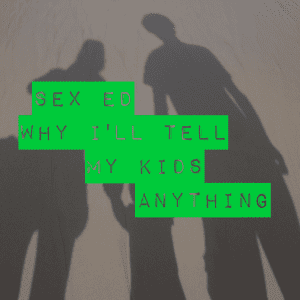I’m pretty much an open book. My friends tell me that I spit “mad truth.” I’m pretty sure that means I’m not shy with my opinions or assessments of a situation; I don’t hold back, and I’m reasonably accurate. That philosophy, good or bad, pervades my parenting style. It even crosses over into my approach to sex ed with my kids: I tell my kids anything they want to know—and sometimes then some.
Sex ed is on my mind right now, because last week one of my newly minted middle-schoolers asked me to “talk dirty” to him.
Seriously?
Of course, he had NO CLUE what that meant. He’d heard it on the Jason DeRulo song “Talk Dirty To Me.” (If your kids listen to pop radio, please go read the lyrics if you don’t know them. While you’re at it, check out the lyrics to this popular Nicki Minaj song. I had to look up the title on Urban Dictionary. Not going to lie: the title may be forever etched in my memory, and I really would have rather stayed naive on this one.)
Getting back to the story, I explained that “talking dirty” is something that sexual partners do to lead up to sexual activity. That sufficiently mortified my youngest into realizing why he should never ask his mom to talk dirty to him, but they still wanted to know more. They wanted EXAMPLES.
Um, no. The only examples I could muster were definitely NOT age appropriate.
I was at a complete loss. So I told them that I couldn’t come up with any age-appropriate examples, but that I would talk with their dad and some friends and figure out how to help them better understand.
Fast forward a few hours… We hopped into the car for a quick trip, and Rob and I explained (per the advice of several friends) that dirty talk is just a way for sexual partners to tell each other what they’d like to do with each other sexually. Some people use the term “dirty” to refer to sex as a way to discourage it outside of marriage or for purposes other than procreation. Thankfully, they were satisfied by that and didn’t ask for examples again. But, it did lead to a very nice conversation about our family values regarding premarital sex and the purpose of intercourse.
I’ve spent a lot of time thinking about what I want my kids to know about sex and sexuality. I imagine you have also (or probably will in the future, if your kids are still really little). Our values may differ, and the specifics of how we teach our kids about sex might not be a perfect match—that’s pretty normal! We all parent differently and have different values.
Here’s what’s important to Rob and me when it comes to our kids’ sex education:
- We want them to know that we’re always willing to talk about and be a resource on anything. Seriously—nothing is off limits, and we do our best to not make them feel embarrassed about or judged for asking.
- We want them to have (age-appropriate) scientifically accurate information about sex, procreation, and disease protection.
- We want to share our moral framework about sex with our kids while allowing them the freedom to question and develop their own sexual morality.
- We prefer they learn something from us rather than from friends who might not fully understand or share the same values and who, at this age, definitely don’t have the experience and emotional maturity to put things into context.
- We want to minimize the opportunity for classmates to take advantage of their naïveté.
- We don’t want them to embarrass themselves or hurt someone else inadvertently by repeating words they don’t understand.
- We want our boys to understand their own self-worth and know how to value other people so that they never devalue a sexual partner later.
- We want our boys to know themselves and their own limits.
- We want our kids to have good communication skills. That includes being clear about what they want, but also listening to their partner with sufficient empathy to put another person’s wants or needs first when necessary.
- We want our sex education (all of it—biology, mechanics, disease protection, and morality) to be inclusive of same-sex relationships, so if someday one of our kids tells us he’s gay, he’ll have no doubt that he is loved and valued.
I truly am an open book when it comes to sex (and pretty much anything). Rob and I work under the premise that the right time to talk about sex is when our kids ask or give us a natural opportunity, be it through songs, TV shows, movies, comments from other kids, etc. In our house, there is no singular sex talk. Hopefully it’s coming in small enough chunks that they can really digest the information.
When my kids were three, they asked how babies were made. For the entire next week, they ran around the house (and pretty much everywhere else, including church) yelling, “Sperm and eggs, sperm and eggs, sperm and eggs!”
When the boys were six, they desperately wanted a baby sister. One of them told Rob to go inside, lie on top of Mommy, and make them a baby sister. That was a great chance to talk about family planning, vasectomies, and adoption.
When the kids were nine, one of them told me to “go suck it.” He had no clue what that meant—he’d just heard it at the baseball field. He didn’t get in trouble; instead, he got information. To my knowledge, he’s never said it again, now that he knows what it means.
I hope the questions keep coming and the boys keep listening, talking, and contemplating, well past the time they become sexually active. Perhaps I’m naive that these chats will last that long, but as long as they are willing, I plan to keep the conversation going.
Sex Ed Resources:
From Diapers to Dating: A Parent’s Guide to Raising Sexually Healthy Children
Written by a sex educator, this is a practical, step-by-step guide for helping parents provide accurate information and communicate their own values to their children.
If you are looking for accurate, developmentally appropriate information about a range of topics, including relationships, gender identity, sexual orientation, sexual health, and cultural influences on sexuality, check out Our Whole Lives.
This curriculum is meant for small groups and has age-appropriate programs starting with kids in Kindergarten. While written by a religious organization, the curriculum contains no religious references nor doctrine, but does encourage self exploration and clarification of personal and group morals and boundaries.
Secrets to Surviving Your Child’s Sexual Development
If you’ve ever tried to tell your six-year-old how babies are made or your 14-year-old how condoms work, you know that grappling with telling your kids about sex can be a sweat-drenched exercise. But it doesn’t have to be.
This is a one-of-a-kind survival guide that will help you stay sane through every stage of your child’s sexual development.













Great post and information, Maggie! As a fellow mom of “newly minted middle-schoolers” (love this phrase, btw), we too are opening up a lot of dialogue about some not-yet-approached areas of sex ed. For moms with younger ones … just a heads up, I’ve found 3rd grade to be a year they really started coming home with questions or statements “Hey mom, this is humping” (with demo) AGH! My daughter’s now in 3rd grade and I’m mentally preparing …
I loved reading this post! My kids are still young but I agree with you. If they ask questions about sex in the future I will definitely answer them. I think its important 🙂
This is awesome! I am totally with you on being open with children and making sure to answer questions honestly within their developmental ability to understand.
Growing up my mom was a nurse so I knew most things about sex ed and health in general before it was probably appropriate. I remember being in first grade and knowing what AIDS was and how you got it. I knew I could always go to my mom with questions. I think because of her honesty, I wasn’t a problematic teenager—I knew the risks of being promiscuous and kept my pants on unlike many of my peers.
Maggie, I absolutely loved this post! Especially the part about not having a singular sex talk with your kids. The idea of teaching them little by little when situations arise is how I have approached talking to my own daughter about sex and I love how eloquently you put it here. Thanks for this post 🙂